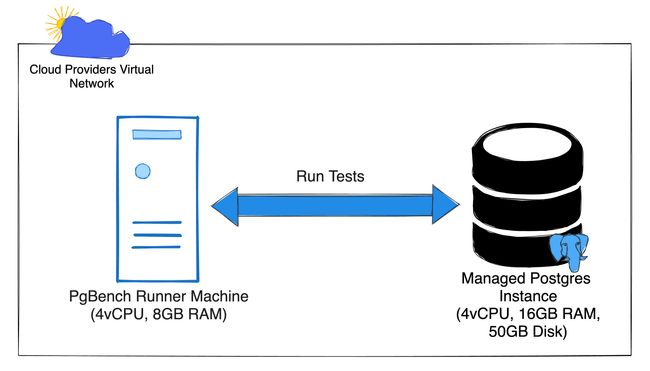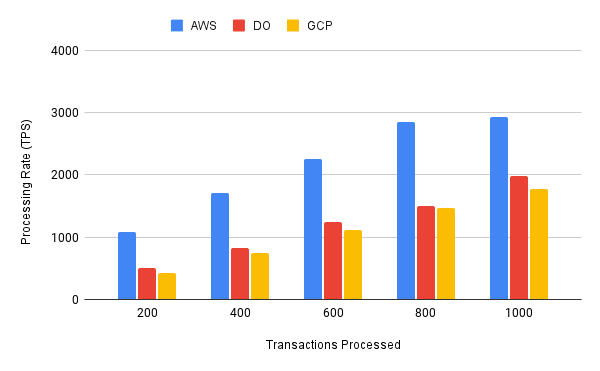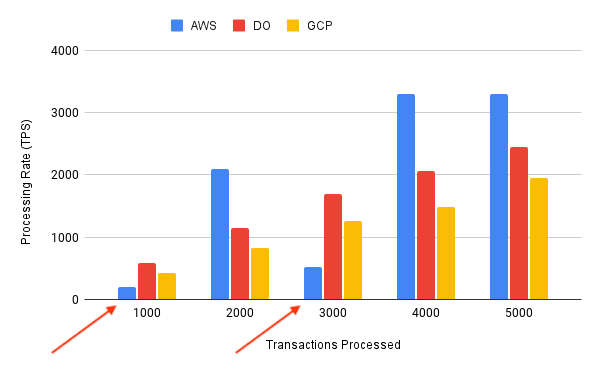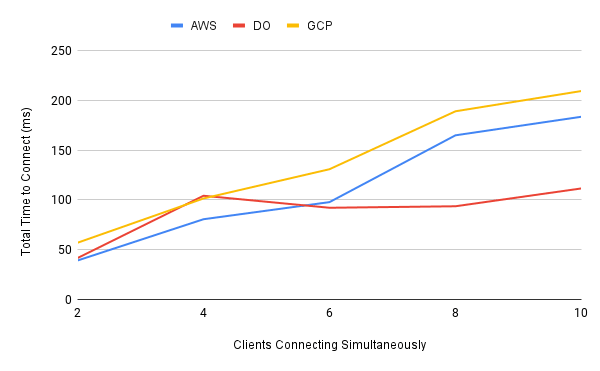Comparing Postgres Performance across Cloud Providers
August 01, 2023
I’ve been working with cloud databases for a few years now, and I’ve always been impressed with the performance of PostgreSQL. However, I recently had an experience that made me question whether all cloud providers are created equal. I was working on a project that required a lot of concurrent database queries, and I was using CloudSQL (GCP’s managed PostgreSQL instance). I noticed the performance of my queries could have been better than expected. I had to tune some parameters to get better performance (I’ll write about this later), but this got me thinking. What if the performance of CloudSQL was just a fluke, or was it similar across other Cloud Providers?
I decided to run a benchmark test to compare the essential performance of managed PostgreSQL instances provided by various Cloud Providers. In this article, I will share the results of my tests. I hope this article will provide additional points to consider when deciding on a cloud database provider.
The Setup
I intended to run a simple benchmark test that mirrors what the average users starting with Postgres would run into. The aim of my test was not to benchmark the performance of Postgres; no, there are loads of tests for that online.
First, the Machines
I opted to use pgbench because it provided an easy way to generate transactions and test the relative throughput. Next was to provision the databases and run pgbench on them. To make the results more fair, I set up the machines (runners) running pgbench within the cloud provider and have put them on the same network as the Postgres instances. This should mirror the standard way people interact with these databases and ensure tests are fair across various database providers.
The specification for the machines used across the service providers:
| Database Instance | 4 vCPU, 16GB RAM, 50GB Storage |
|---|---|
| Runner Instance | 4 vCPU, 8GB RAM |
Next, the Load
Pgbench provides a couple of configuration parameters to vary the type of load it generates when running the benchmark. After several experiments, I finally ran these tests with the following configuration.
| Number of Clients | from 2 to 10 |
|---|---|
| Transactions per Client | 100 |
This configuration means the tests will execute between 200 and 1000 transactions concurrently (load distributed across four threads).
Now with all that set. I ran the test multiple times and collated the results in a CSV.
The Result
I’ve only run the tests on the following platforms: Amazon Web Services (AWS), Google Cloud Platform (GCP) and Digitalocean (DO). I’ll run on Azure, Heroku and Bare Metal next (subscribe to be notified of those results).
Without further ado, below is a chart of the average processing rate as the number of transactions increased.
And we have a winner. AWS outperforms the others, with DO coming in second place. The performance of GCP and DO are close too.
Plot twist
AWS is not the clear winner 😅; While running the tests repeatedly, I noticed that GCP and DO gave consistent results, but AWS’s performance varied largely. Let’s look at some results of a run that illustrates this.
I needed to increase my test load to get this variation to happen more often, but notice the results are now skewed, and AWS sometimes performs lower than GCP and DO.
Another Dimension (Connection Time)
Pgbench also outputs the time it takes all the clients to connect to the database. I was also interested in seeing if there was any significant difference in the times for runners to connect the database instances (remember these are on the same private network)
These results generally look okay. My significant observation was that the Digitalocean Postgres instance connected faster than others. This may be due to better private network implementations (faster routing) or better machines, but I cannot say for which exactly.
The connection time for clients is quite important because this can lead to spikes in the performance of your application when it has to reconnect to the database. Most application frameworks create connection pools to help mitigate this (does PHP support connection pools now? 🫢), so you should ensure your application has one to minimise the chances of these spikes affecting your application.
Concluding Thoughts
AWS came out as the highest-performing database instance in this test, but not consistently. Digitalocean’s Managed Postgres Database came out as the consistently performant database, and GCP came in third place.
The Transaction Processing Rate (TPS) increases as the load increases, which is what I intended, I wanted to evaluate how fast each database instance processes transactions when under normal operating conditions. You can consider other factors to improve your instances’ performance. For instance, many of these cloud providers allow you to configure Postgres parameters, and these usually come in handy when you are familiar with the workload your application deals with. But the Performance of the default configuration should be plenty enough for small to medium size applications (which is another subtle point I’m trying to prove with this post).
If you want to run the tests, the code is Open Source on my PerfectsEngineering/loadtesting-cloud-pg repository. Follow the instructions in the Readme to run them for yourself.
Next, I’ll run the tests on Azure and Heroku’s PostgreSQL instances and bring everything to full Circle by running a similar test on a bare-metal server. Subscribe to know when that post goes live, and do let me know in the comment if there are other Database providers you would like me to consider as well.
UPDATE: The second part of this article that shares the result of running these tests on Azure and a Bare Metal Machine is available now.
ALSO, YOU SHOULD READ THESE ARTICLES
K Means and Image Quantization [Part 2]
This is the second part of a two part tutorial series. If you are yet to read the first part, I recommend you start from there. In part 1, I… Read more
January 28, 2018Robotics in Nigeria: My “Eye Opening” Trip to the Wo...
I had the opportunity of accompanying the Team from iLab ROC for their Contest in the National World Robotics Olympiad (WRO) Finals 2015 in… Read more
October 02, 2015How I Automated the Pgbench Tests using Terraform an...
I recently ran tests to benchmark the performance of Postgres databases offered by various Cloud Providers. The overall steps of running a… Read more
August 29, 2023



